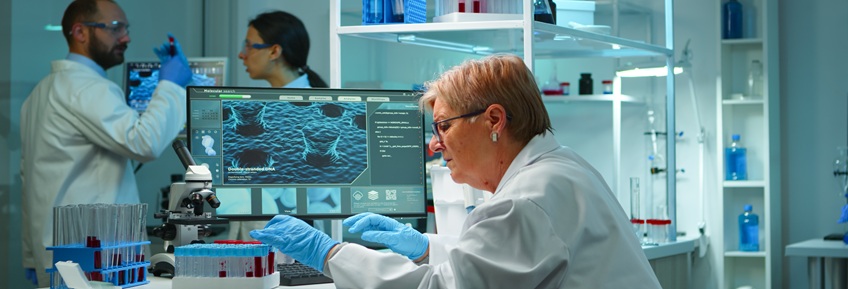
The discovery of new medicines has never been a quick or inexpensive task. It can take over a decade before a single drug is discovered and brought to the market. AI in drug discovery is altering that reality through large-scale analysis of data, simulating molecular interactions, and detecting therapeutic opportunities that might be overlooked. Besides this science-technology integration being efficiency-related it’s also a matter of exploring new horizons in treatment conceptualization, testing, and delivery.
Early research efforts in AI in drug discovery introduce a truly impressive level of accuracy and speed in finding promising compounds compared to the old trial-and-error approaches. According to a 2025 review by Ocana et al., AI uses multi-omics data and network-based methods to identify new therapeutic targets, aids in structure-based drug design, and fuels de novo molecule generation with vastly shortened trial timelines.
Key breakthroughs include:
Artificial intelligence is transforming the way trials are designed and participants are selected and is enhancing accuracy and reducing timeframes. A survey conducted by Tufts CSDD at the 2025 DIA Global Annual Meeting found that AI and machine learning decreased trial planning time by 18 percent due to the use of smarter protocol design and site selection.
Even more significant results were presented in a breakthrough study, TrialMatchAI. The AI-based recommendation system identified a matching trial in the top 20 recommendations in 92% of oncology patients, and more than 90% accuracy in eligibility classification. This type of performance demonstrates the reliability of AI tools to filter through the clinical and unstructured data to direct the recruitment of patients.
The major advances of AI in this area are:
AI’s role in streamlining drug development is reshaping timelines and budgets with real-world impact. A recent report by Reuters has quoted a panel of experts forecasting over 50% cost and time savings over the next three to five years, courtesy of AI in drug discovery, a real game-changer in the industry.
The advancement of precision medicine is one of the greatest contributions of AI in drug discovery. Combining genetic profiles, lifestyle information, and clinical history, artificial intelligence can be used to detect patterns that human researchers can overlook. This allows the treatment to be designed to fit the individual patient instead of just using generalized protocols. According to a 2025 study by Yoo SK et al. in Nature Medicine, the most accurate predictions of cancer immunotherapy efficacy were made using artificial intelligence models that examined routine blood tests and clinical data, highlighting the role AI can play in optimizing treatment outcomes.
Keyways artificial intelligence in healthcare supports targeted therapies include:
Pharmaceutical research on AI in the field has potential applications in not only oncology but also autoimmune diseases, neurological disorders, and rare genetic disorders. Over time, with the continued expansion of datasets and more advanced algorithms, precision medicine will cease to exist as a specialty and become the expectation in healthcare in the future. This development makes AI one of the key drivers of transforming therapeutic innovation.
AI is pioneering interdisciplinary labor in the discovery of drugs, integrating computational approaches, lab data, and profound scientific understanding, to accelerate research and get it right. Drug compounds and clinical experience are imported by pharmaceutical corporations in entire sets. At the same time, AI researchers offer exceedingly sophisticated algorithms that allow predicting the interactions between molecules and optimizing pipelines. A team of academics provides essential perspective in the fields of biology, chemistry, and translational science to confirm findings.
These partnerships are already changing schedules. A recent survey conducted among biotech and clinical research professionals estimates that integrating AI in drug discovery with cutting-edge dependence on animal tests may reduce the development expenses and timeline by 50 percent or more in the next three-five years.
Application of AI to drug discovery presents severe ethical, regulatory, and data challenges that should be carefully monitored: a fundamental ethical issue is the bias of the algorithm. The Systematic Literature Review on Healthcare AI Bias points to the exclusion of underrepresented groups, including rural or marginalized populations, which may lead to inaccurate predictions and biased results. Another problem is transparency. Many models are black boxes, and it is difficult to describe how decisions are made that are critical in high-stakes drug development.
Drug discovery AI is moving past hype and already changing the landscape of the pharmaceutical development and delivery process. It can transform modern medicine by speeding up the research process, making treatments much cheaper, and allowing them to be more precise. But there are critical issues of morality, laws, and data security. The way ahead is to combine innovation with accountability so that artificial intelligence in medical care and AI in pharmaceutical research yield safer and more effective medicines to help patients all over the globe.